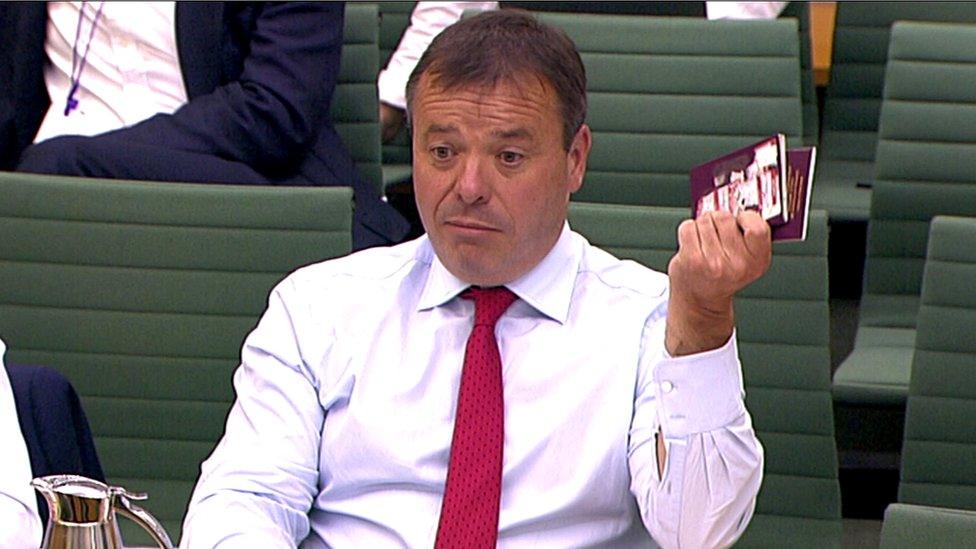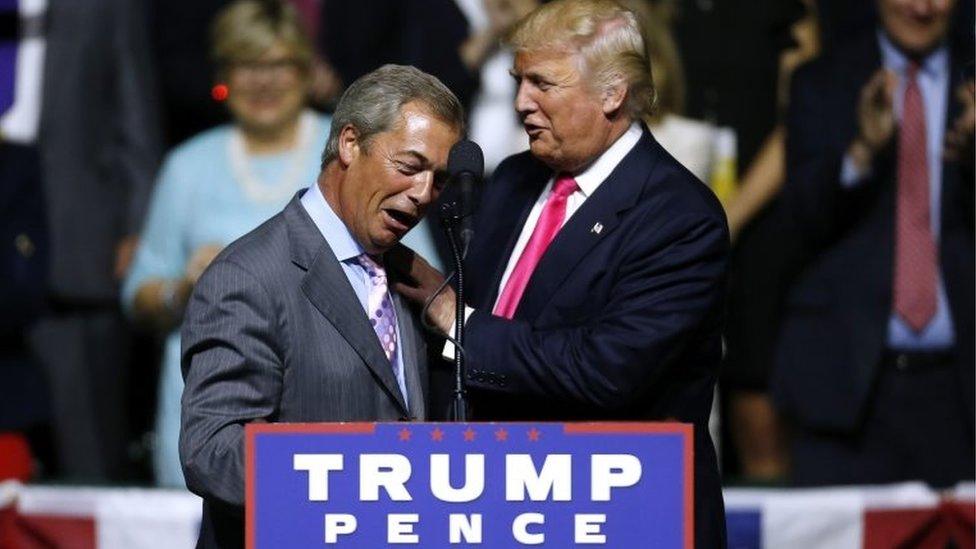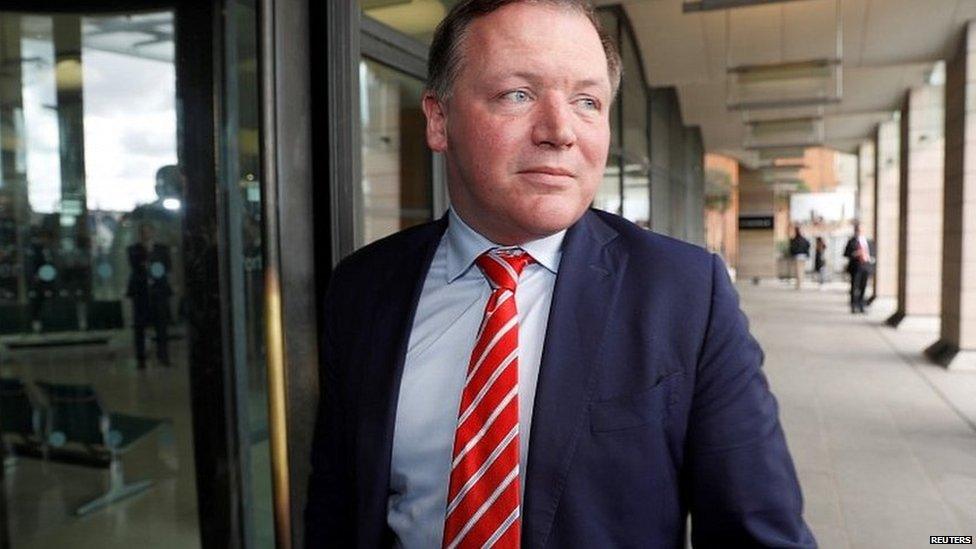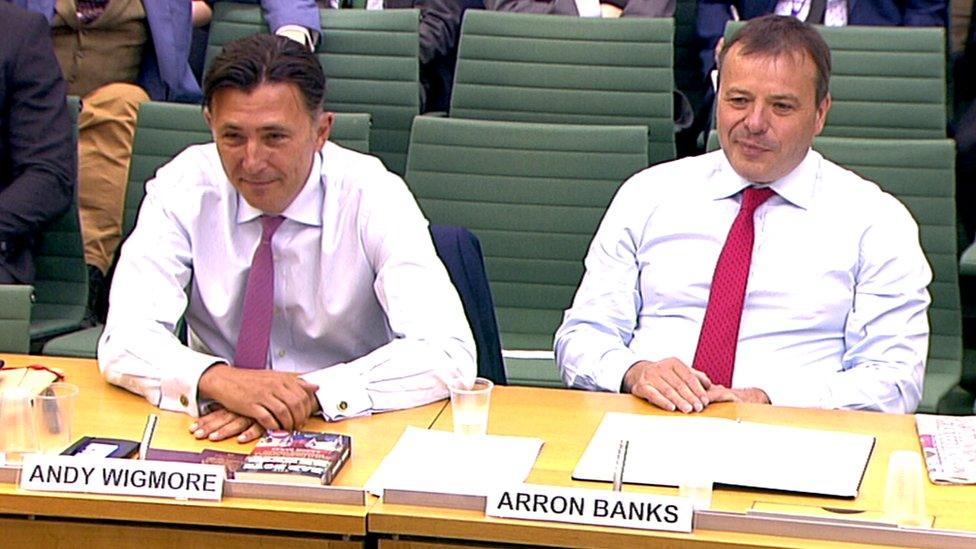Leave.EU led people up the garden path - Arron Banks
- Published
Arron Banks laughs off the idea he is an "evil genius with a white cat controlling the whole of western democracy"
Arron Banks has told MPs probing "fake news" his Brexit campaign had sometimes "led people up the garden path".
But he said politicians were also guilty of spin and claimed Parliament was the "biggest source of fake news".
The tycoon, who spent more than £6m on Leave.EU, said he had faced "absurd" claims of Russian conspiracies.
Media committee chairman Damian Collins said it was "difficult to know" whether to take his evidence - and that of colleague Andy Wigmore - seriously.
Leave.EU, which was backed by then UKIP leader Nigel Farage, lost out to Vote Leave in the battle to become the official Leave campaign in the 2016 EU referendum.
It ran a "disruptive" campaign instead, Mr Banks told the committee, adding: "We were not above using alternative methods to punch home our message or lead people up the garden path if we had to."
Mr Wigmore, Leave.EU's director of communications, said "the piece of advice that we got, right from the beginning, was remember referendums are not about facts, it's about emotion and you have got to tap into that emotion".
He said the campaign had aimed to "make fun" of journalists and his role in it had been that of an "agent provocateur".
Asked what the difference was between provocation and lies, he said: "If you are trying to sell something or put a good case over to somebody you will tell the best story. If that's provocation - or a lie, if you want to call it that, yeah."
Who is Arron Banks?

Bristol-based insurance tycoon who was a Lloyd's underwriter before starting his own firms
One of the biggest political donors in UK history, thought to have given up to £9.6m to Leave.EU and UKIP
Born in Cheshire, the twice married father-of-five was a close friend and supporter of Nigel Farage
A Conservative supporter until 2014 when he defected to UKIP, giving them £1m
His Leave.EU campaign targeted its message at working class voters angry about EU immigration
Mr Banks used his appearance before the Commons media select committee to hit back at claims he was involved in a conspiracy with Russian officials, saying there was "not one shred of evidence" for it.
He was "not an evil genius with a white cat controlling... western democracy", he told the committee, accusing its members of being "Remainers" with a "vested interested in trying to discredit the Leave campaign".
He then went on to attack the credibility of Brittany Kaiser and Chris Wylie, whistleblowers who had previously given evidence to the committee about controversial data firm Cambridge Analytica.
He dismissed Cambridge Analytica as an "advertising agency" that "did a little bit of politics on the side".
"We had two or three meetings with them and it became clear to me that - as is true in a lot of politics - there is a lot of sizzle and sometimes not a lot of substance," he said.
He also addressed revelations at the weekend that he had had two more meetings with the Russian ambassador Alexander Yakovenko than he had previously disclosed in his book on the referendum battle, The Bad Boys of Brexit.

Former UKIP leader Nigel Farage spoke at a Trump campaign rally in August 2016
The last of these was in November 2016, three days after Mr Banks, Mr Wigmore and the former UKIP leader Nigel Farage met Mr Trump in New York following his presidential election victory.
According to details of emails reported by the Sunday Times and the Observer, Mr Banks and Mr Wigmore also discussed potential business opportunities in Russia including a proposal involving six gold mines.
Mr Banks attempted to laugh off suggestions of a conspiracy over his meetings with Mr Yakovenko, telling MPs: "I was hoping for a good lunch and that is what I did gain from it."
He added: "The only thing we gave in the second meeting was the telephone number of the (Trump) transition team because the Russians wanted to get hold of the transition team."
He said Leave.EU had "briefed the American security services on everything that transpired".

Mr Collins and his committee is looking into fake news in elections
Mr Banks denied he was in Moscow in February 2016, as claimed by the Sunday Times, and produced passports containing Russian visas which he said proved he had been in Moscow twice in recent years, in March 2015 and October 2014.
Mr Wigmore said he had first sought a meeting with Russian officials at a UKIP conference in his role as a then diplomat for Belize, a small central American nation and former British colony.
"His (Mr Banks') wife is also Russian. We thought it would be nice," he told MPs.
Mr Wigmore said he had spoken to the ambassador about possible Russian investments in a banana farm in Belize and a port, owned by a bank belonging to former Conservative deputy-chairman and donor Lord Ashcroft.
Mr Wigmore said the meeting with Mr Trump had not been planned and only came about because the US President's adviser Kellyanne Conway had asked if they "wanted to go and see the boss" when they were in Trump Tower, in New York.
He claimed he gave the Trump transition team the phone number of Number 10 Downing Street, because the team had "no relationship" with the British government.
Mr Banks - who was grilled by MPs for nearly three hours - refused to answer a final set of questions from Labour MP Ian Lucas, saying the session had overrun and he had a lunch appointment to go to.

Mr Wigmore had kicked off the session by calling on Mr Collins to stand aside as chairman because he accepted hospitality from "Putin's number one man in the United Kingdom" and might be "conflicted".
Mr Collins recorded a trip to Chelsea Football Club, owned by Russian oligarch Roman Abramovich, on his register of member's interests.
He called the suggestion a "nice try" adding "you might have better intelligence than me... I didn't know that Roman Abramovich was Putin's number one man in London".
In a statement after the hearing, Mr Collins said: "Mr Banks and Mr Wigmore themselves put on the record that they frequently lie, exaggerate, misspeak and misunderstand.
"So it is difficult for the Committee to know if we should take all of their answers seriously when it comes to data sharing and misuse, campaign spending, and their meetings with high ranking Russian officials."
He said his inquiry would be writing to the pair to follow up some of the points they had made, adding: "Our inquiry is about getting to the truth of these matters."